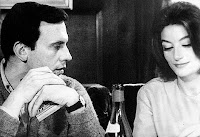.jpg) A few years back, The Onion ran an article about a man who was arrested for stalking. As the story progresses, it becomes increasingly clear that the gentleman's crimes were, essentially, plot devices taken from various romantic comedies. While the article was hilarious, it was also painfully true: anyone choosing to take his or her cues about male/female interactions from the big screen would be convinced that all relationships either involve zany schemes or are snoozefests featuring Richard Gere and Diane Lane.
A few years back, The Onion ran an article about a man who was arrested for stalking. As the story progresses, it becomes increasingly clear that the gentleman's crimes were, essentially, plot devices taken from various romantic comedies. While the article was hilarious, it was also painfully true: anyone choosing to take his or her cues about male/female interactions from the big screen would be convinced that all relationships either involve zany schemes or are snoozefests featuring Richard Gere and Diane Lane.The key elements of Claude Lelouche's A Man and a Woman are clearly expressed in the title. The movie basically involves a man and a woman, both widowed and both single parents, who are attempting to fall in love. In the process, they must both navigate their own (and each other's) emotional baggage and escape the memories of their respective spouses. The basic story is simple, yet never simplistic, the romantic quest reduced to its most essential elements.
 Contrasting the uncomplicated story, the soundtrack and cinematography are both beautiful, lush, and groundbreaking. The music, by Francis Lai, is a mix of lounge, Samba, and a more traditional orchestral soundtrack, and is beautifully integrated into the movie. Any fan of Bebel Gilberto will probably get a thrill out of watching the characters listening to Samba together, and the discovery of the then-novel musical form parallels the discovery of new love.
Contrasting the uncomplicated story, the soundtrack and cinematography are both beautiful, lush, and groundbreaking. The music, by Francis Lai, is a mix of lounge, Samba, and a more traditional orchestral soundtrack, and is beautifully integrated into the movie. Any fan of Bebel Gilberto will probably get a thrill out of watching the characters listening to Samba together, and the discovery of the then-novel musical form parallels the discovery of new love.The cinematography, whose beauty belies Lelouche's origins as a fashion photographer, moves back and forth between black and white, full color, and sepia tones. At times, it takes on a documentary style, only to return to an exquisite intimacy. A careful observer will notice shots that clearly inspired many subsequent directors, including Robert Altman, whose long-distance close ups arguably owe a debt to Lelouche.
Largely forgotten today, A Man and A Woman was incredibly significant in its time. It won the Grande Prix at the 1966 Cannes Film Festival, as well as the Best Foreign Film award at both the Oscars and the Golden Globes. More significantly, Lelouche and the female star, Anouk Aimee, were both nominated for Oscars in their respective categories, a distinction that is very rare for a foreign language film.
 Admittedly, some of the elements seem dated and Americans might have a hard time with the film's shrugging acceptance of the male lead's mistress. On the other hand, for anyone who realizes that male/female interaction runs a little deeper than defiled apple pie, A Man and A Woman makes a sterling case for thoughtful, transformative romance.
Admittedly, some of the elements seem dated and Americans might have a hard time with the film's shrugging acceptance of the male lead's mistress. On the other hand, for anyone who realizes that male/female interaction runs a little deeper than defiled apple pie, A Man and A Woman makes a sterling case for thoughtful, transformative romance.






































No comments:
Post a Comment